Today I had a flashback to my days on Allen's Pond, a beach in the farthest reaches of Southern Massachusetts (but don't you DARE call that the Cape, because it's NOT, or so I was harshly informed one time when a "native Cape Codder" asked me "had I ever been to the Cape? Which I might add, is like asking a person from Brooklyn if they'd ever been to Manhattan. If you've lived your life on the South Shore, you probably went to the Cape on a FIELD TRIP!) I don't know what it was that got me to thinking about it really. I remembered driving in the pouring rain to get there, field surveys in all kinds of weather, the feeling of being outside and loving it - anyways all those things have led to the following post....
When I got back from Kenya, I was totally out of it. I kind of didn't know how to function and was all sad a depressed and sh*T. Africa does that to you, if you really love it. It sucks you in, and if you're like me, and you know you can't stay but feel in your bones that you actually have place there, it messes with your head to leave. I cried for almost the entire 16 hour plane trip home. Fo' realz, I was a hot mess on the plane, so bad that the man sitting next to me from London to Boston stared at me for most of the flight. At one point I turned to him and said "I've just come from Kenya, you see, and I've been there for almost four months and....and...I just.... *commence sniffling, pathetic, sad sniffling" He looked at me horrified and adjusted his Red Sox cap and just goes "It's ok." Ha! It's ok. OK MY ASS! I thought at the time.
After moping around my house for a week marvelling at novelties such as ice and flush toilets I figured I should try and get a job. My problem was that I was rather anti-social. When I got called by the Audubon Society to be a plover monitor I was certainly interested, but what really clinched it was that I'd be working on a beach that had been hit by a massive oil slick from a tanker that had run aground in Buzzard's Bay. Therefore the beach would be closed, as in DEVOID OF PEOPLE. Perfect, I thought, me and the birds and my dark and twisty and angsty thoughts, just perfect.
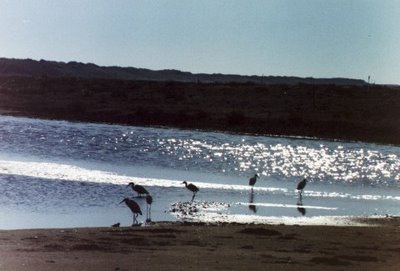
All day long I'd walk the beach watching my little plovers. One horribly rainy cold day in July, a day so cold and wet that I had to wear snow pants, my winter parka and gloves to stay warm, I discoverd a nest we thought we'd lost to predators. A few days before we notcied the eggs were gone and we couldn't locate the parents. Nest #4 had been the best nest all year - it had four perfect eggs in it, which is the largest clutch a piping plover can lay.
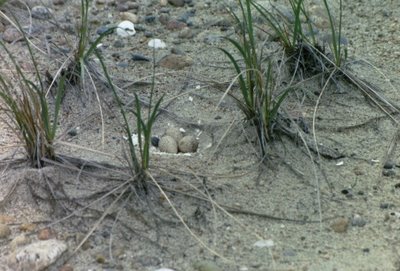 It was in a great location, behind a salt pond against a marsh, situated in such a way that it was protected from wind and from the ATV's the oil cleanup crews were driving on the beach, plus you could only access that nest at low tide, when it was safe to cross the channel connecting the sea and the salt pond - the currents were fierce otherwise. The parents were incredibly attentive and would do a dramatica death scene whenever I approached. Plovers are much like killdeer and will feign a broken wing to lure predators away from nests. The nest 4 plovers took it to a whole new level of feigning. As soon as I approached, on would run off the nest down the beach and do its little broken wing dance.
It was in a great location, behind a salt pond against a marsh, situated in such a way that it was protected from wind and from the ATV's the oil cleanup crews were driving on the beach, plus you could only access that nest at low tide, when it was safe to cross the channel connecting the sea and the salt pond - the currents were fierce otherwise. The parents were incredibly attentive and would do a dramatica death scene whenever I approached. Plovers are much like killdeer and will feign a broken wing to lure predators away from nests. The nest 4 plovers took it to a whole new level of feigning. As soon as I approached, on would run off the nest down the beach and do its little broken wing dance. 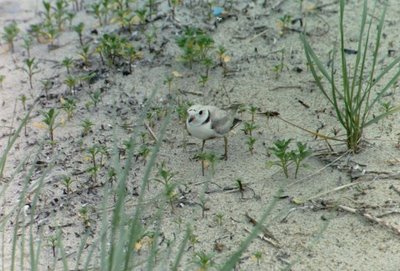
If I continued to approach the nest, a second bird would flop at my feet, stretch out its wing at an awkward angle, then bend its neck backwards and open its beak and make a sound as if it were being strangled. I didn't even know birds could make sounds like that. I used to just stand there, looking at the tiny bird at my feet going through his mock death throes just to protect his four perfect eggs.
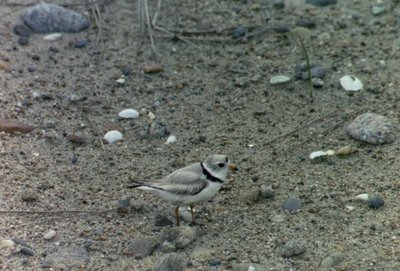
If provoked further, the birds would even attack my feet - I probably should've taken my job more seriously and written a paper on that population of plovers and their unique behaviors, because surely no one has ever observed an attack plover before.
Naturally I was shocked when I found an empty nest 4 and two missing parents. We'd had missing parents before. We were positive that the nest 1 male had succumbed to poisoning from trying to preen the oil off of his body. We'd had bad eggs before, too, even ones that refused to hatch, like nest 2, whose mother tried to incubate them but was unsuccessful because she kept having to get off her nest to run away from passing ATVs. Chicks were predated here and there by merciless gulls and hungry fox and coyote, but nest 4, the valedictorian of plover nests? How could this be? I received the news on a cold and rainy Monday that the previous Friday, nest 4 and its inhabitants had disappeared - eggs, parents, everything. The theory was that the chicks hatched and attracted some sort of large mammal, maybe a skunk, coyote or maybe a fox, and the animal had eaten the small chicks and then finished off the parents that were so desperately trying to defend them. I sat in the sanctuary's headquarters, a small house overlooking the marsh and beach and was overcome with disappointment. I was always sad when we lost a nest, but nest 4 was my favorite, and I felt like I had failed those birds somehow.
I went out to do my survey in the rainy cold. I had to - the birds had to be accounted for every day, and the weather down there was so unpredictable anyways, that you might as well just go out - the saying about New England "If you don't like the weather, wait five minutes" - was never more accurately applied to an environment as it was down in Buzzard's Bay, so I went out on bad days with the hope that soon, it'd clear up. Usually this happened, but of course, not this day. I walked to the farthest edge of the beach and began to work my way westward, back towards the house. I crossed the channel to see where nest 4 used to be. It was pointless to look for prints, the rain had washed them away. I did find the small depression in the sand, lined with shell bits and dried seaweed where the plovers had so lovingly incubated their four little eggs. I sat there for a moment, pretty bummed that my favorite birds weren't there to greet me. Then, lo and behold, I heard a plover peep. We had other nests back there, but I thought 'what if...' There, just ahead of me in the driving rain, stood male #4, and in the distance, female #4. As if that wasn't enough excitement, male #4 adjusted his stance to reveal four tiny and helpless round balls of fluff, four perfect baby plovers.
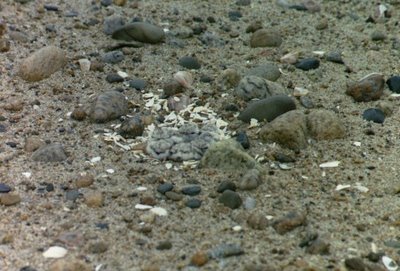 "Awww YES" I said, doing a fist pump. There was our #4 family perfectly intact.
"Awww YES" I said, doing a fist pump. There was our #4 family perfectly intact.I ran back to our base house and burst in the door - "I FOUND NEST FOUR!" I screamed. My boss looked at me incredulously. "It was predated, I thought" she said. "Nope," I replied "they left the nest. I don't know why they moved everyone out of the nest, but they're out there, all huddled together under their parents, safe and dry and warm." We were all so happy, another victory for our plovers.
Over the next week, our plovers became mini-celebrities.
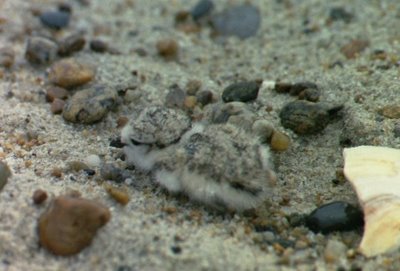
Because of the oil spill, US Fish and Wildlife kept a close eye on us, even though Audubon controlled the land on which the plovers nested, and when I faxed the daily reports over, they were shocked to hear about the birds that had "come back from the dead." They were our banner nest, the true test to see if the Allen's Pond population could make it through the oil spill and fledge and fly on to bigger and better things - and so they did. Towards the end of the season, the chicks found their wings.

I would chase them down the beach (a plover's instinct is to run first, fly later) to try and encourage them to fly as much as possible. One day, as is the nature of migrating birds, they were just gone, gone to Florida, gone to the Carolinas, we'll never know, but surely, on to bigger and better things.
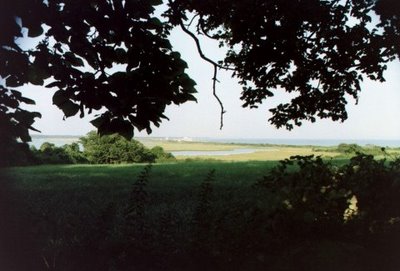
No comments:
Post a Comment